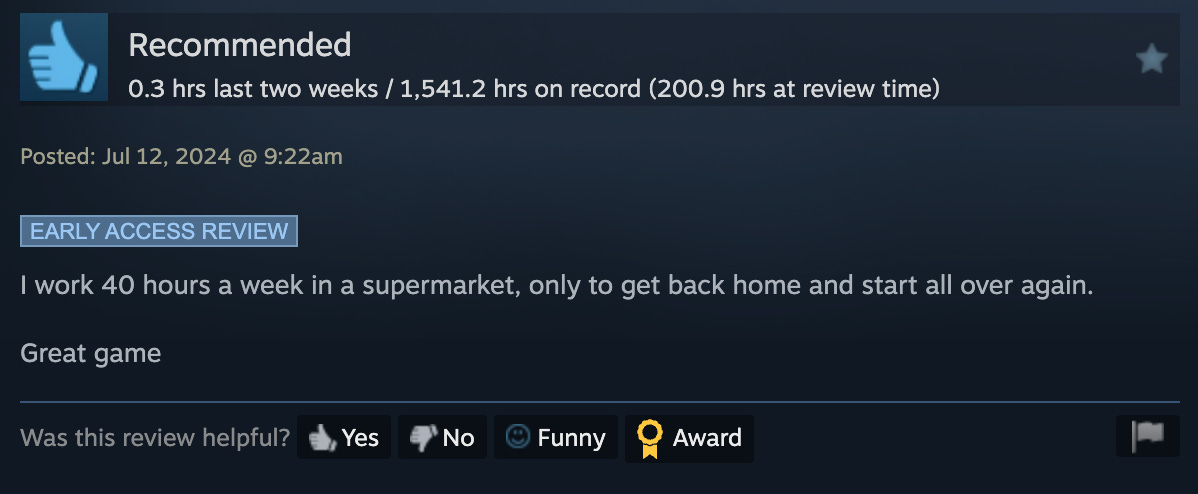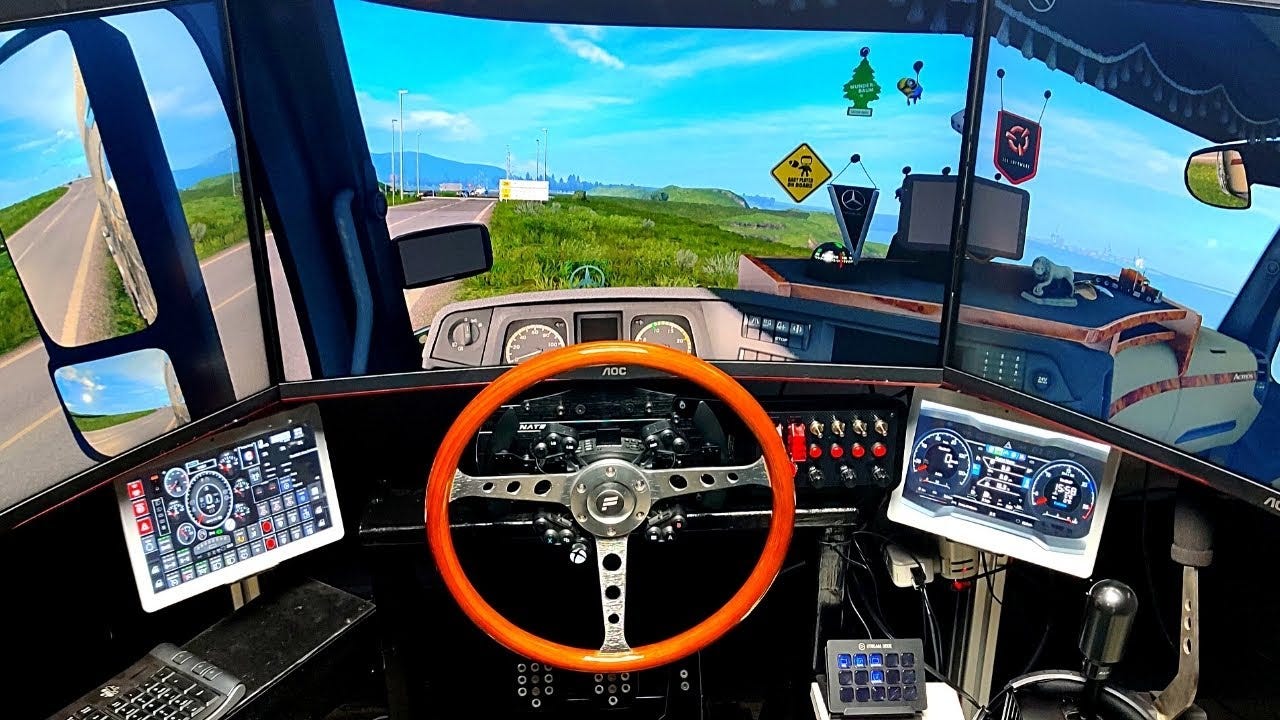It’s 5pm on a Tuesday. You hit send on one last email and shut down your work computer for the day. You grab your keys, go out to the parking lot, and get in your car for your 30-minute commute home from the office.
You pull into your driveway, press the garage door opener, park your car, and set your keys down on the side table. You grab a Coke Zero from the fridge and head down to the basement.
You boot up your computer and turn on your three 32-inch monitors carefully placed side by side at just the right angle. You open Steam, launch Euro Truck Simulator 2, and set out for a long night of deliveries.
You were made for this, you’ve got just the right rig.
Euro Truck Simulator 2 is part of a genre of games on Steam categorized as hobby or job simulators. These are first-person PC games focused on a single job or activity. Most involve running a store or small business and checking off a growing list of tasks.
Think of any non-desk job and there’s probably a simulator for it: Supermarket Simulator, Parcel Simulator, PowerWash Simulator, Fast Food Simulator, Liquor Store Simulator, Car Dealer Simulator, Storage Hunter Simulator, Recycling Center Simulator, Farming Simulator, etc.
When I tell people about these games who are unfamiliar with the genre, their immediate reaction is shock, usually followed by curiosity, and sometimes a bit of disgust. A critical reader might consider the job simulator genre yet another twisted example of what Jean Baudrillard called hyperreality in Simulacra and Simulation. The simulation replaces the original, and eventually becomes the more meaningful experience. Or they might connect the genre to David Graeber’s concept of Bullshit Jobs. With the proliferation of “fake email jobs,” workers have become increasingly alienated from their own labor. The purpose of work hides beneath layers and layers of abstraction. At least the simulated job has clear goals and tight feedback loops.
I think these imagined but familiar critiques miss an important point. A lot of games in the genre are genuinely fun and well designed. And their absurdity is often part of the appeal. The irony of coming home from a day job to play a game simulating an entirely different job (or in some cases the same job) isn’t lost on players.


Rather than treating these games as side effects, or even causes, of societal ills through a postmodern media theory lens, I think it’s worth exploring a simpler theory. Some people genuinely enjoy things that others find boring, confusing, or even repulsive.
After I dropped out of college I got a job at Urban Outfitters where I came up with outfits for the mannequins to wear on the men’s floor, but I was surprised to find that I enjoyed the task of repeatedly folding hundreds of pieces of clothing just as much.
writes about this in relation to the phenomenon of false consensus effect.Some of you guys wake up at 5am to make almond croissants, some of you watch golf on TV, and some of you are willing to drive an 80,000-pound semi truck full of fidget spinners across the country. There are people out there who like the sound of rubbing sheets of Styrofoam together, people who watch 94-part YouTube series about the Byzantine Empire, people who can spend an entire long-haul flight just staring straight ahead. Do you not realize that, to me, and to almost everyone else, you are all completely nuts?
No, you probably don’t realize that, because none of us do. We tend to overestimate the prevalence of our preferences, a phenomenon that psychologists call the “false consensus effect”. This is probably because it’s really really hard to take other people’s perspectives, so unless we run directly into disconfirming evidence, we assume that all of our mental settings are, in fact, the defaults. Our idiosyncrasies may never even occur to us.
These job simulator games are situated within a long history of simulation games going back to Microsoft Flight Simulator in 1982 and the various tycoon and sims games in the 90s. In more recent years, both big, well-funded developers and small indie teams consisting of just a few people are making job simulator games.
Publishers like PlayWay have found massive commercial success in the job simulator genre by taking an extremely optimized approach to the development process. They’ll often put up a Steam page or an early demo to see what the reception is from players, and use that data to decide whether to fund full development. Some players find this practice off-putting or straight up scammy.
Both GameDiscoverCo and How To Market a Game have published nuanced takes on this approach. And WIRED magazine published an article in 2021 titled The Polish Simulator Company Gamers Love to Hate.
Some indie developers and industry critics are quick to dismiss rising genres as passing fads. They sigh when “yet another roguelike deckbuilder” demo drops on Steam. They obsess over originality while gamers are eager to buy a slight variant of a game in a sub-sub-genre they already love.
The core game mechanics in many big budget AAA games often boil down to running across a large island doing somewhat tedious tasks disguised as epic quests. These tasks feel engaging because they’re supported by layers of narrative, world-building, and a sleek sci-fi or fantasy theme. In contrast, the tasks in job simulator games are direct and honest, there’s no layers of abstraction.
One extreme case of this honesty can be seen in TrickShot Simulator. The game is essentially a simulator version of the living room trick shot videos you can find on TikTok. The game features listed on Steam sell the player on the “time-consuming masterpieces” with trick shots that can take “minutes or even hours to accomplish.” This is peak content for Twitch streamer Northernlion, who ranted for hours on end until he completed all the stages.
There’s a gut reaction to label these types of games as slop or brain rot. Critics will point at the unlit environment art, asset-pack props, seemingly recycled game mechanics. But I think they’d be missing the point. There’s meditative bliss to be found in between the shelves of Supermarket Simulator.
Northernlion’s rant from the TrickShot Simulator stream embedded above sums it up nicely:
This is not brain rot, this is zen. You don't get it.
Something being boring doesn't make it brain rot. Something being exciting but having no actual quality to it is brain rot. This is boring. This is brain exercise. This is brain genesis.
This is so much less of a cognitohazard than like an Undertale let’s play. This content has you guys typing like real motherfuckers in chat. You're typing with emotion. You're typing “good luck.” You're typing “I can't watch this shit.” You're typing “I can't bear to be a part of this experience anymore.”
You're feeling something. You're feeling something human, man!
When you watch an Undertale let’s play all you're typing is like “hey if you go back to Snuffy, Snuffy has a new shirt that you could wear that would increase the size of your hitbox when you get into combat with Sans.”
That shit is not real, man! This is real!






